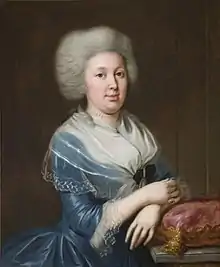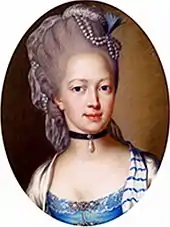| Wilhelmina Caroline of Denmark and Norway | |||||
|---|---|---|---|---|---|
 Portrait by Johann Heinrich Tischbein | |||||
| Landgravine consort of Hesse-Kassel | |||||
| Tenure | 31 October 1785 – 1803 | ||||
| Electress consort of Hesse | |||||
| Tenure | 1803 – 14 January 1820 | ||||
| Born | 10 July 1747 Christiansborg Palace, Copenhagen, Denmark | ||||
| Died | 14 January 1820 (aged 72) Kassel, Germany | ||||
| Spouse | |||||
| Issue | |||||
| |||||
| House | Oldenburg | ||||
| Father | Frederick V of Denmark | ||||
| Mother | Louise of Great Britain | ||||
| Religion | Lutheranism | ||||
| Danish Royalty |
| House of Oldenburg Main Line |
|---|
.svg.png.webp) |
| Frederick V |
|
Princess Wilhelmina Caroline of Denmark and Norway (Danish: Vilhelmina Karoline, German: Wilhelmina Karolina) (10 July 1747 in Christiansborg Palace, Copenhagen – 14 January 1820 in Kassel), was the Landgravine consort of Hesse-Kassel and later the Electress of Hesse-Kassel by marriage to William I, Elector of Hesse.
Life
Early life

Princess Wilhelmina Caroline was born on 10 July 1747 at Christiansborg Palace, the recently completed principal residence of the Danish Monarchy on the island of Slotsholmen in central Copenhagen. She was the third child and second daughter of King Frederick V of Denmark (1723–1766), and his first spouse Queen Louise (1724–1751), daughter of King George II of Great Britain. She was born just under a year after her father had ascended the Danish throne.[1]
At birth, Wilhelmina Caroline had an elder sister, Princess Sophia Magdalena, and the family was joined by a son Crown Prince Christian in 1749 and another daughter, Princess Louise in 1750. In 1751, four years after Wilhelmina Caroline's birth, her mother Queen Louise died during her sixth pregnancy, just aged 27 years.[2] The following year, her father married Duchess Juliana Maria of Brunswick-Wolfenbüttel, who gave birth to Wilhelmina Caroline's half-brother, Prince Frederick in 1753.[3]
Already during her childhood, it was decided that she should marry her first cousin Hereditary Prince William of Hesse-Kassel when they became adults. Prince William's mother Mary of Great Britain and her mother Louise were sisters, and Wilhelmina Caroline and William grew up together from 1756, after Mary, who was estranged from her husband, Landgrave Frederick II of Hesse-Kassel, moved to Denmark to take care of her deceased sister's children. She brought her three sons with her, who were brought up at the Danish court, and William was introduced to Louise as a playmate during their childhood.[1]
Wilhelmina Caroline and William married at the chapel of Christiansborg Palace on 1 September 1764. One month after their wedding, they left Denmark and settled in the county of Hanau-Münzenberg which had been separated from the landgraviate of Hesse-Kassel and assigned to William. Here they took up residence in the city of Hanau, where they lived with their own court.[1]

Life in Hesse
During the first years of their marriage, the relationship between Wilhelmina Caroline and William was described as happy. In 1770, six years after their marriage, Wilhelmina Caroline was visited by her brother-in-law Crown Prince Gustav of Sweden and his brother Prince Frederick, and at that occasion, the marriage between her and William was favorably compared to the marriage of her sister Sophia Magdalena of Denmark and Gustav of Sweden, and a suggestion was made for her and William to visit Sweden, with the unofficial thought that their example might have a good effect on her sister and royal brother-in-law. The courtier Gustaf Johan Ehrensvärd, a member of the Swedish entourage, described Wilhelmina Caroline and William on this occasion in 1770:
- "She is the sister of our Crown Princess, but as soon as she opens her mouth, the words come out different. She is charming, energetic, worshiped by her court... when the couple are with each other, they play as children, and during their games they produce one new child each year... I believe that it is the fault of the husband, when a woman, who is not of bad character, neglects him ..."[4]
However, this good relationship was not to last: five years later, William had his first mistress, Charlotte Christine Buissine, and after this, the marriage deteriorated with William being constantly unfaithful and introducing a succession of official mistresses at court, with Buissine followed by Rosa Dorothea Ritter and Karoline von Schlotheim and William producing a great number of illegitimate children.
Wilhelmina Caroline herself was described as beautiful, distant, kind and sympathetic: in 1804, she still spoke Danish without accent and had a strong attachment to her birth country.[5]
William succeeded as Landgrave William IX of Hesse-Kassel in 1785, and in 1803 was raised to the rank of Elector of Hesse as William I.
Later life
In 1806, Hesse was occupied by France. Her spouse and son fled to her brother-in-law Charles of Hesse in Schleswig, but she remained until a French governor was installed, after which she moved to her daughter Amalie in Gotha.[6]
She spent the duration of the Kingdom of Westphalia (1806–13) in exile, among other places in Schleswig and in Prague. In 1813, the spouses returned to Kassel.
Issue
- Landgravine Marie Friederike (1768–1839), married Alexius Frederick Christian, Duke of Anhalt-Bernburg
- Landgravine Karoline Amalie (1771–1848), married Augustus, Duke of Saxe-Gotha-Altenburg
- Frederick (1772–1784), died in childhood
- William II (1777–1847)
Ancestry
| Ancestors of Princess Wilhelmina Caroline of Denmark[7] |
|---|
References
Citations
- 1 2 3 Bobé 1904, p. 592.
- ↑ "Louise af Storbritannien". gravsted.dk (in Danish). Retrieved 21 January 2022.
- ↑ Holm, Edvard (1894). "Juliane Marie". Dansk biografisk Lexikon, tillige omfattende Norge for tidsrummet 1537-1814 (in Danish) (1st ed.). Copenhagen: Gyldendals Forlag. 8: 612.
- ↑ Gerd Ribbing (1958). Gustav III:s hustru. Sofia Magdalena. Stockholm: Alb. Bonniers Boktryckeri. sid 178-79 ISBN (Swedish)
- ↑ Bobé 1904, p. 592-593.
- ↑ Charlottas, Hedvig Elisabeth (1936) [1800–1806]. af Klercker, Cecilia (ed.). Hedvig Elisabeth Charlottas dagbok [The diary of Hedvig Elizabeth Charlotte] (in Swedish). Vol. VII 1800–1806. Translated by Cecilia af Klercker. Stockholm: P.A. Norstedt & Söners förlag. p. 476. OCLC 14111333. (search for all versions on WorldCat)
- ↑ Genealogie ascendante jusqu'au quatrieme degre inclusivement de tous les Rois et Princes de maisons souveraines de l'Europe actuellement vivans [Genealogy up to the fourth degree inclusive of all the Kings and Princes of sovereign houses of Europe currently living] (in French). Bourdeaux: Frederic Guillaume Birnstiel. 1768. p. 6.
Bibliography
- Bobé, Louis (1904). "Vilhelmine Caroline". In Bricka, Carl Frederik (ed.). Dansk biografisk Lexikon, tillige omfattende Norge for tidsrummet 1537-1814 (in Danish). Vol. 18 (1st ed.). Copenhagen: Gyldendals forlag. pp. 592–593.
- Jørgensen, Harald (1943). "Vilhelmine Caroline" (PDF). In Povl Engelstoft; Svend Dahl (eds.). Dansk Biografisk Leksikon. Vol. 25 (2nd ed.). København: J.H. Schultz Forlag. pp. 595–596.
